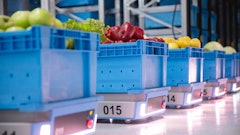
Global events continue to impact how companies do business. The COVID-19 pandemic, rising political tensions, inflation, consolidation of suppliers and material shortages have all led to a volatile operating environment requiring faster, more informed decision-making and excellence in execution.
In 2024, navigating disruption and risk will remain critical. Staying resilient in the face of uncertainties is necessary to ensure top-notch customer service. This demands a proactive approach focused on communication and transparency and the ability to adapt swiftly to changing circumstances in the dynamic business landscape.
Here are three actionable tips food logistics and supply chain professionals can implement to enhance and streamline their supply chain processes.
Tip 1: Create a service-first mindset
Retail partners should be placed at the center of every business decision. This type of customer-first approach allows you to gain a better understanding of your customers’ needs and fosters agility in the face of disruptions. This doesn’t mean simply meeting their needs; rather, it is taking this a step further to truly anticipate what comes next. By actively listening to feedback and analyzing data, you can tailor products to exceed expectations.
One simple yet powerful way to do this is through routine performance reviews. A typical performance review includes uncovering the root cause of any issues, actions to be taken and the improvements your retail partners can expect. Routine performance reviews can help your team meet customers’ deadlines and deliverables while providing a deeper look at your own internal processes and capabilities. Weaving data into these conversations not only removes complexity but also builds trust. Furthermore, it cultivates a culture of innovation, as teams strive to create solutions that truly resonate with their retail partners, fostering a dynamic and responsive partnership.
Tip 2: Establish clear communication channels
Effective communication is crucial in any supply chain. First, it’s important to create an open line of communication through various channels such as regular meetings, emails and collaborative platforms.
Once this has been established, food manufacturers can begin sharing short-term supply challenges with retailers on a regular basis to help avoid potential disruptions. It sounds simple, but many overlook the power of smaller, more frequent communications on items such as inventory levels, order status and disruptions. It’s also important to remember that you’re never tied to a specific process – this can be refined at any time to ensure efficiency and adaptability. Encourage feedback from both parties to further build a foundation of trust and transparency.
Tip 3: Break down silos
It is imperative to establish a one-team mentality to serve your retail partners. Silos are a common challenge, especially in larger organizations, which can hinder collaboration and lead to lack of agility. Ensuring everyone on your team is clear on a common goal helps create the synergies necessary to maintain a "service first" mindset. To start, organizations can clearly define their overarching mission and vision. Next, they must break down these broad goals into specific, measurable, achievable, relevant and time-bound objectives. You can foster collaboration by involving team members in the process. Objectives must then be communicated clearly with an emphasis on their significance in achieving your customer service goals. Regular reviews and adjustments to adapt to changing circumstances are necessary and encourage a sense of ownership among team members, fostering commitment and accountability.
As the food industry navigates the uncertainties of the future, the success of supply chain processes is contingent on a commitment to customer-centricity, transparent communication and breaking down internal barriers. By embracing these principles and implementing actionable strategies, food companies can not only weather disruptions but also emerge as leaders in providing exceptional service to their retail partners.

























